Related Research Articles
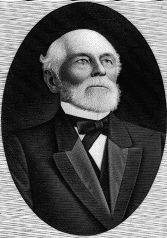
William Marsh Rice was an American businessman who bequeathed his fortune to found Rice University in Houston, Texas. Rice was murdered by his valet Charles F. Jones while sleeping. The murder was part of a plot to forge Rice's will. The instigator of the murder, attorney Albert T. Patrick, was sentenced to death.

Charles William Duncan Jr. was an American businessman, administrator, and politician best known for serving as U.S. Secretary of Energy in the Cabinet of President Jimmy Carter from 1979 to 1981. He had previously served as Carter's United States Deputy Secretary of Defense during the Iranian Revolution. Earlier, Duncan had run the family business, Duncan Coffee Company of Houston, Texas, for seven years, until the Coca-Cola Company acquired it in 1964. After seven years on the Coke board, Duncan became the corporation's president.

James Howard Marshall II was an American billionaire businessman, academic, and government official. He was involved with and invested in the petroleum industry via academic, government and commercial endeavors. He owned 16% of Koch Industries. Marshall was married to model and celebrity Anna Nicole Smith during the last 14 months of his life. His estate became the subject of protracted litigation, which was reviewed by the Supreme Court in Marshall v. Marshall and Stern v. Marshall. The court kept the will and testament intact and substantially all of the assets in Marshall's estate wound up in trusts for the benefit of his daughter-in-law, Elaine Tettemer Marshall, and her family.

The Permanent University Fund (PUF) is a sovereign wealth fund created by the State of Texas to fund public higher education within the state. A portion of the returns from the PUF are annually directed towards the Available University Fund (AUF), which distributes the funds according to provisions set forth by the 1876 Texas Constitution, subsequent constitutional amendments, and the board of regents of the Texas A&M University System and University of Texas System. The PUF provides extra funds, above monies from tax revenues, to the UT System and the Texas A&M System which collectively have approximately 50 percent of state public university students. The PUF does not provide any funding to other public Universities in the State of Texas.

William Myron Keck was an American businessman and philanthropist. He was best known as the founder of Superior Oil Company, author Kevin Krajick has described Keck as "the world's greatest oil prospector, a man whose instincts about the location of petroleum were so uncanny, some believed him clairvoyant." Keck established the W. M. Keck Foundation.
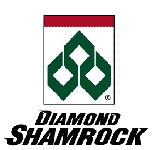
Diamond Shamrock Corp. or Diamond Shamrock Refining and Marketing was an oil refinery and gas station company in the United States, headquartered in San Antonio, Texas.
Richard Edward Rainwater was an American investor and philanthropist. With an estimated net worth of $3 billion, he ranked 211th on the Forbes 400 in 2015.
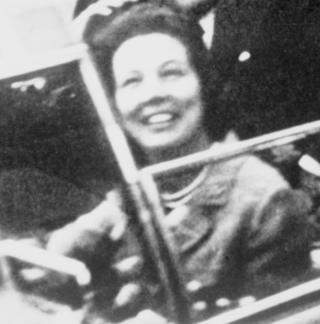
Idanell Brill Connally was the First Lady of Texas from 1963 to 1969. She was the wife of John Connally, who served as Governor of Texas and later as Secretary of the Treasury.
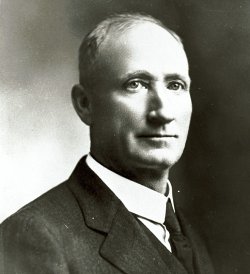
Pattillo Higgins was an American businessman and a self-taught geologist. He earned the nickname the "Prophet of Spindletop" for his endeavors in the Texas oil business, which accrued a fortune for many. He partnered to form the Gladys City Oil Gas and Manufacturing Company, and later established the Higgins Standard Oil Company.

Joseph Stephen Cullinan was a U.S. oil industrialist. Although he was a native of Pennsylvania, his lifetime business endeavors would help shape the early phase of the oil industry in Texas. He founded The Texas Company, which would eventually be known as Texaco Incorporated.

James Addison Baker was an American attorney and banker in Houston, Texas. He was born James Addison Baker, Junior, and "Junior" appeared in his signature for many years. After the death of his father in 1897, he started signing his name "Captain James A. Baker," and from that point on people referred to him as Captain Baker.
The Welch Foundation, based in Houston, Texas, is one of the United States' oldest and largest private funding sources for chemistry researchers. It is a non-profit organization named for Robert Alonzo Welch, an industrialist who provided the funds to set up the foundation, along with scholarships, endowments, and funding for chemical research. Since its founding in 1954, the organization has contributed to the advancement of chemistry through research grants, departmental grant programs, endowed chairs, scholarships, and other special projects at educational institutions in Texas. The foundation hosts an annual chemical research conference in Houston that attracts chemists from around the globe and also sponsors The Welch Award in Chemistry as well as the Norman Hackerman Award in Chemical Research.
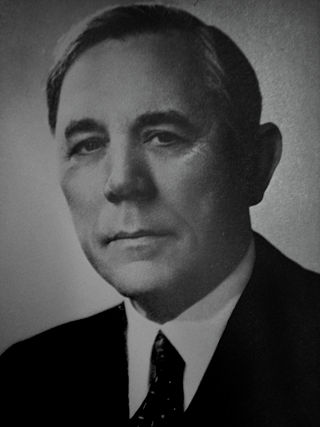
Hugh Roy Cullen was an American industrialist and philanthropist. Cullen was heavily involved in the petroleum industry having struck oil near Texas in 1928. He was a large supporter of multiple educational institutions in and around Houston, in one of which, the University of Houston, he became a longtime chairman of the board of regents. He is considered one of the most important figures in Texas during the "oil boom" era.

BP p.l.c. is a British multinational oil and gas company headquartered in London, England. It is one of the oil and gas "supermajors" and one of the world's largest companies measured by revenues and profits. It is a vertically integrated company operating in all areas of the oil and gas industry, including exploration and extraction, refining, distribution and marketing, power generation, and trading.
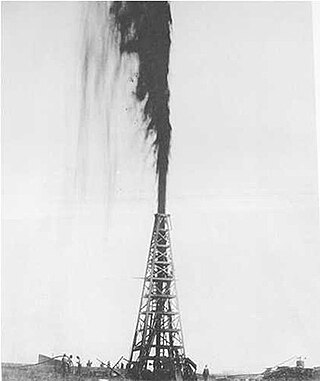
The Texas oil boom, sometimes called the gusher age, was a period of dramatic change and economic growth in the U.S. state of Texas during the early 20th century that began with the discovery of a large petroleum reserve near Beaumont, Texas. The find was unprecedented in its size (worldwide) and ushered in an age of rapid regional development and industrialization that has few parallels in U.S. history. Texas quickly became one of the leading oil-producing states in the U.S., along with Oklahoma and California; soon the nation overtook the Russian Empire as the top producer of petroleum. By 1940 Texas had come to dominate U.S. production. Some historians even define the beginning of the world's Oil Age as the beginning of this era in Texas.
James A. Chapman was a businessman closely associated with Tulsa, Oklahoma. He was nephew, son-in-law and business partner to Robert M. McFarlin.
The Welch Award in Chemistry is awarded annually by the Robert A. Welch Foundation, based in Houston, Texas, to encourage and recognise basic chemical research for the benefit of mankind. The award, which has been given since 1972, is one of the largest and most prestigious awards in the field of chemistry. Several of its recipients subsequently were awarded the Nobel Prize.
George H. Hermann was an entrepreneur based in Houston, Texas. He served the Confederacy in the American Civil War. He was a dealer in wood products and cattle. He invested in real estate and was an early investor in oilfields around Humble, Texas, which led to a financial windfall from a rich oil strike. He donated most of his estate to the public upon his death, including land for the Houston Museum of Fine Arts and Hermann Park. Land and other assets funded the Hermann Hospital Foundation.
Monzer Hourani is a Lebanese-American engineer and inventor. He is the founder and president of Medistar, a company specializing in healthcare real estate development. Hourani was born and educated in Lebanon, where he had a traumatic childhood. He moved to the US in 1965 where he obtained bachelor degrees in architecture and architectural engineering from the University of Texas at Austin.
References
- 1 2 3 James A. Clark. "Welch, Robert Alonzo". Texas State Historical Association. Handbook of Texas. Retrieved 2019-08-24.
- ↑ Amanda Yarnell (2004). "Robert Alonzo Welch: The Man Behind the Legacy". Chemical & Engineering News. 82 (47): 66.